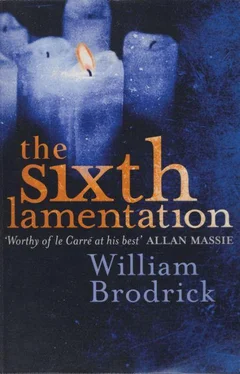William Brodrick - The Sixth Lamentation
Здесь есть возможность читать онлайн «William Brodrick - The Sixth Lamentation» весь текст электронной книги совершенно бесплатно (целиком полную версию без сокращений). В некоторых случаях можно слушать аудио, скачать через торрент в формате fb2 и присутствует краткое содержание. Жанр: Триллер, на английском языке. Описание произведения, (предисловие) а так же отзывы посетителей доступны на портале библиотеки ЛибКат.
- Название:The Sixth Lamentation
- Автор:
- Жанр:
- Год:неизвестен
- ISBN:нет данных
- Рейтинг книги:5 / 5. Голосов: 1
-
Избранное:Добавить в избранное
- Отзывы:
-
Ваша оценка:
- 100
- 1
- 2
- 3
- 4
- 5
The Sixth Lamentation: краткое содержание, описание и аннотация
Предлагаем к чтению аннотацию, описание, краткое содержание или предисловие (зависит от того, что написал сам автор книги «The Sixth Lamentation»). Если вы не нашли необходимую информацию о книге — напишите в комментариях, мы постараемся отыскать её.
The Sixth Lamentation — читать онлайн бесплатно полную книгу (весь текст) целиком
Ниже представлен текст книги, разбитый по страницам. Система сохранения места последней прочитанной страницы, позволяет с удобством читать онлайн бесплатно книгу «The Sixth Lamentation», без необходимости каждый раз заново искать на чём Вы остановились. Поставьте закладку, и сможете в любой момент перейти на страницу, на которой закончили чтение.
Интервал:
Закладка:
Mere Hermance had worked in the laundry during the war. She was lodged upon a wicker chair in the convent gift shop, recalling the good old days when religious life was hard. Anselm had to drag her towards the subject of his visit.
‘Oh, yes, Father, it was a terrible time, terrible. I saw poor Prior Morel fall like a rag doll. I waited for him to get up. There were three children hiding in the orphanage.’ She smiled, as only the very old can; intimating an acceptance of things that once could not be accepted.
‘Do you remember the two men who stayed at the Abbey in 1944?’ asked Anselm gently
‘I do, yes, but not much. In those days religious life was lived as it should be. You didn’t talk to men unless you had to.’
Anselm nodded in firm agreement.
‘I never spoke to either of them,’ she said. ‘We were told it was as secret as the confessional. We were used to that sort of thing. But I do remember one thing, Father-’
Mere Hermance broke off to answer the phone. The shop was open from three to five… the biscuits were handmade… by the young ones with nothing better to do… fifty francs… very well worth it… goodbye. She put the phone down arid carried on as if no interruption had occurred: ‘When I came here as a novice in 1937 there were thirty-nine sisters. The Prioress at the time was a dragon. Her father had been in the army and…’
Anselm listened patiently for ten minutes or so before he cracked and reminded her of what she had been about to say.
‘Oh yes, that’s right. He came to the orphanage almost every day’
‘Who did?’ pressed Anselm.
‘One of the young men we were hiding. He talked and played with four or five little German boys and girls. Those were the last Jewish children to come here. Their parents had fled Germany to France, only to be hunted all over again. They saved their children and then perished. He was a good fellow to visit those poor dears. One of them never spoke and had the deepest brown eyes you have ever seen.
‘Do you remember which one came?’
The phone rang again. The nun listened distractedly, once more delivering pat lines on the quality of biscuits and the weakness of the young. She put the receiver down. ‘As I was saying, the Prioress was a dragon-’
‘Mere Hermance, the young man, do you recall which one?’
She looked darkly into the past, into the presence of a banished fear. ‘I think it was the German.’
Unfolding a large starched handkerchief, she wiped her eyes. ‘It was a terrible time, Father, a terrible, terrible time.’
Chapter Eighteen
1
Agnes sat by the kitchen table, her hands limp upon her lap, palms open. Her head leaned forward slightly and to one side, as if in a trance of concentration. It was, of course, not quite that. Her posture was assuming a life of its own, pulling her body slowly down, with Agnes quietly tugging the other way, her blue eyes bright with resistance. She was still able to look after herself, but not for much longer — Agnes was tired by evening and soon the slumping would encompass the day Freddie knew it but had no idea what to do, given Agnes’ refusal to involve anyone skilled or trained in her care. By default, an interim system had emerged to which Agnes did not object. Each evening a member of the family took it in turns to drop by, to make sure everything was fine before she went to bed. And Agnes cooperated not because she required their help but because she knew they needed to come.
Sitting opposite her, Lucy tipped the green beans out of the bag and began the ritual of nipping and throwing, taking off the curled ends and putting the long remaining stems into the waiting pan. Agnes watched.
‘What’s he like?’ asked Agnes, deadly calm, her eyes following the deft movements of Lucy’s fingers.
‘Older than me and younger than me at one and the same time. The past means as much to him as the future, maybe more.
‘You’ve missed one,’ said Agnes, pointing towards the pan with her head. Lucy retrieved the rogue. The soft clipping of her nails, the patter in the pan, the ticking of a clock in the hail suspended time’s nimble passing. The moment lay open, unexplored, healing, inhabited by them alone. The stray cat, no longer stray but ensconced and enthroned, idled by, surveying his subjects with transcendent scorn.
‘He’s known Mr Snyman all his life.’
Lucy glanced over to Agnes and met in her eyes the question, the plea. Lucy turned away She would not provide the answer… no, Pascal did not refer to you… I’m sorry, but he didn’t seem to know that Jacques had had a son. Instead, Lucy said, ‘Mr Snyman believes that Brionne would probably condemn Schwermann if he got the chance.’
‘Does he?’ asked Agnes, made alert. ‘Are you sure?’
‘Yes.’
From somewhere immeasurably cold she said, ‘Maybe he’s right.’
Stung by her grandmother’s remark, Lucy pushed the pan across the table. Agnes lifted a wavering spoon of salt from a bowl and let the grains spill into the water.
Lucy said, ‘I’ve a small role to play in the trial. I will be there on your behalf.’ She would say nothing of her intention to confront Brionne with what she now knew and compel him to enter the courtroom. Her grandmother would discover that in the happening.
Agnes nodded, unblinking, her mouth sloping to one side. It was a smile, against the will of failing muscle and the tiny, dying engines of the nerves. Then she breathed a sort of laugh, leaned back, her face averted, and said: ‘Victor was no fool.’
Lucy boiled water, mesmerised by the rage becoming steam. It vanished in the air, to reappear upon the window, water once more, streaming down the pane, to be wiped away by Agnes.
2
Anselm returned to a sunny day in England. The sight of Larkwood pierced him. In a flash he longed to hear the bells and find himself in the psalms that named everything when he could not. At the entrance to the Priory, Father Andrew said, ‘Schwermann’s grandson, Max, wants to see me tomorrow afternoon. I’d like you to be there.’
‘Of course.
‘Are you all right?’ The Prior glanced briefly sideways.
‘Yes, thanks.’
Funny, Anselm thought wistfully, watching the Prior’s square back as he slipped through a side door, this is want I’d wanted all along, to be involved in the fray to be called upon, and now it’s happening it has somehow lost its savour.
Max Nightingale was a painter. By which he meant, he said, someone who paints pictures that few people buy but who continues to forsake career and financial security in order to paint more pictures that might never be sold. He made regular money working as a waiter or, when things became unbearable, smiling over a cash till at McDonald’s. Anselm placed him at about twenty-seven. He had close-cropped hair and held his head ever so slightly to one side, as if anticipating a sudden slap. They were taking tea by Anselm’s favoured spot on the south transept lawn. Warm sunshine fell over them. Max spoke as if language was a clumsy tool, hesitating occasionally, his eye on a mental image that defied representation in a sentence. But when he did name something it stood out starkly, because of the unexpected angle of his observation.
‘I said to my grandfather — look, hundreds of thousands of Jews are being transported across Europe to a small village in Poland. They won’t fit in.’
‘What did he say to that?’ asked Father Andrew
‘He said, “Go to King’s Cross. Stay there for an hour or two, watching the trains leave, one after the other. Then go outside and look at the people in the Street, buying their newspaper, getting a taxi. Do you think they know the ones on the trains will all be killed? Day after day?”’ Max raised his hands as if there was nothing else to say, knowing the explanation was somehow wanting.
Читать дальшеИнтервал:
Закладка:
Похожие книги на «The Sixth Lamentation»
Представляем Вашему вниманию похожие книги на «The Sixth Lamentation» списком для выбора. Мы отобрали схожую по названию и смыслу литературу в надежде предоставить читателям больше вариантов отыскать новые, интересные, ещё непрочитанные произведения.
Обсуждение, отзывы о книге «The Sixth Lamentation» и просто собственные мнения читателей. Оставьте ваши комментарии, напишите, что Вы думаете о произведении, его смысле или главных героях. Укажите что конкретно понравилось, а что нет, и почему Вы так считаете.












